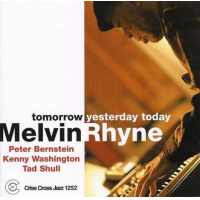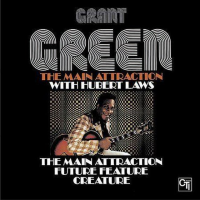Home » Jazz Articles » Liner Notes » Reeds and Deeds: Cookin'
Reeds and Deeds: Cookin'
So with the credentials of our two leading men well defined, it might be interesting to ponder the lineage of the quintet's moniker and the titles of their two discs. For starters, Reeds and Deeds also names a 1963 album on Mercury Records by multi-instrumentalist Roland Kirk, a recording that just so happens to feature pianist Harold Mabern, a regular collaborator in groups led by Alexander. Now, with album titles like Wailin' and Cookin', there's more than a tip of the hat to those classic 1956 recordings by the Miles Davis Quintet that led to a series of Prestige releases, namely Workin', Steamin', Cookin', and Relaxin'. Finally, one must consider that this pair follows in the footsteps of other iconic two tenor cohorts such as Sonny Stitt and Gene Ammons or Eddie "Lockjaw" Davis and Johnny Griffin.
Now while this modest lesson suggests that these guys have done their homework, it should not be considered a foregone conclusion that the group is simply rehashing previous glories or engaging in the kind of cutting contests that were so popular in the '50s. Nothing could be farther from the truth, as Alexander and Stewart have fashioned a collaborative ensemble that benefits strongly from the combined efforts and varied experiences of our front line partners.
"I think our styles are so different that it's not as much of a cutting session as it could be," explains Stewart. "Eric definitely raises the bar pretty high and we're definitely trying to push one another to play better. We're coming out of some of the same people more or less, but we think differently. [Still,] there are enough similarities that we get a cohesive sound, but we're different enough that it's still interesting." As for Alexander, while the camaraderie is an obvious factor in making this kind of situation musically stimulating, he also admits to some healthy rivalry. "When you're going head to head," Eric affirms, "you've really got to jump all over the tunes or else you sound like you're getting blown away by the other cat."
Returning from the group's first effort is pianist David Hazeltine, a veteran of many Criss Cross dates and leader of a half dozen sessions of his own for the label including the recent Perambulation (Criss 1276). "He's a great accompanist and he's always listening," says Stewart. "It's one of those things where you know someone is a great accompanist when you play better when they're comping." Further commenting on Hazeltine's many talents, Alexander interjects, "He's a fine composer and arranger and he brings that kind of structure to every musical situation."
Another lock tight rhythm team steps up to spell Peter Washington and Kenny Washington, who performed the bass and drum duties on Wailin'. Regular collaborators John Webber and Joe Farnsworth have worked with Harold Mabern, Jimmy Cobb, and Michael Weiss, in addition to teaming together with Alexander on numerous gigs and record dates such as Summit Meeting and Dead Center. Their hookup can also be heard to great advantage on Farnsworth's A Beautiful Friendship (Criss 1166). Speaking of Webber, Stewart says, "He's one of my favorite bass players [because] he gets such a beautiful sound out of the bass and he's also an incredible soloist." As for Joe, he states unequivocally, "I don't think there's anyone out there who can play some of the stuff that he plays. He's just a real force on the drums." To which Eric adds, "He's my favorite drummer to play with and we've known each other for so long that everything we do is really second nature at this point."
Although the program here does not include any originals, Alexander and Stewart have managed to dig deep for an agreeable selection that includes bossa nova, quicksilver bebop, the blues lexicon, and a ballad feature for both tenor men. Each number goes for a particular feel and utilizes the two horns in a way that most complements the melody. The pair approaches unison passages with an especially well-developed precision, the technical proficiency needed to accomplish such a feat not to be taken for granted. Like the ideal club set, much thought has been given to the pacing and flow of each track with plenty of blowing space for Stewart, Alexander, and Hazeltine to boot.
Not as well known as his other signature numbers, "Conception" and "Lullabye of Broadway," George Shearing's "She" is seldom performed these days but is destined to be picked up now that Stewart and Alexander have revisited this beguiling composition. "I discovered that tune one night after a gig at Fat Cat," explains Stewart. "Pianist Sacha Perry showed that to me and Joe Cohn and then the following week he and I started playing it at our steady Tuesday night gig at Smalls." The piece boasts the standard AABA form of eight bars each section, with a contrasting Latin groove that distinguishes the bridge. Grant is the first soloist and for terms of identification can be heard on the left channel throughout the date. Eric is up next, followed by a brief turn from Hazeltine.
Tight unison passages and a brisk tempo help make "So in Love" a lesson in survival of the fittest. Grant is up first again, cleverly utilizing the tune's melody as a springboard for his mercurial statement. Eric then comes on strong, eating up the changes and utilizing the full range of his horn in a way that has always set him apart from his peers.
"I've always wanted to record this beautiful tune, " says Alexander of "Never Let Me Go." While he sticks to the ballad tempo at first, his ideas start flowing in such a way that in order to allow them unfettered development he jumps into double time for much of his solo statement. Hazeltine then gets a turn before Eric's return, a closing gambit that further illuminates the saxophonist's considerable maturity and confidence.
Several years before the smooth tenor of Stan Getz met the cool strains of bossa nova or Walter Wanderley hit the charts with "Summer Samba," there was the film Black Orpheus, loosely based on the Greek legend of Orpheus and Eurydice. Putting Antonio Carlos Jobim and Luiz Bonfa on the musical map, the songs they penned for the soundtrack still provide fodder for jazz musicians today. Alexander supplies a fresh arrangement that "filled the need for a Latin number" while providing for "a nice variety of tunes to keep the album interesting."
Saxophonist Gene Ammons had more than his share of run-ins with the law and just prior to a lengthy prison stay that would keep him off the scene for much of the mid to late '60s he would record Boss Tenor, arguably one of his best albums. The centerpiece of that set is the blues anthem "Hittin' the Jug," heard here in an Alexander arrangement that boasts its own share of rewards. "You can't be a tenor player in Chicago and not learn this one," he says while speaking from experience. Note the way the pair voices that descending run in unison, then alternates solo turns at the arpeggiated lick that ends each two bar phrase. A clever stop-time device also launches the solos of both Alexander and Stewart.
Grant's ballad feature, "Trouble is a Man," is a lovely Alec Wilder piece that reminds us of the unique melodic gifts of this oft-neglected composer. As Stewart explains, "That's on At Ease with Coleman Hawkins, one of my favorite Hawk records. There's [also] a video of Carmen McRae singing it on that Jazz Casual series. She sings it with the verse and after hearing that I decided I wanted to include the verse as well."
"Who Can I Turn To" comes from the collaborative team of Anthony Newley and Leslie Bricusse, penned for the 1965 musical The Roar of the Greasepaint, The Smell of the Crowd. Commenting on the sagacious idea to take this one at a quicker pace than usual, Eric acknowledges, "I like taking tunes that are generally done as ballads and swinging them." Agreeable to this arrangement, Grant says, "I used to play it quite a bit, but hadn't played it in awhile. I used to do it in E flat, but we do it [here] in F."
One of the many Charlie Parker lines based on the chord changes to "I've Got Rhythm," "Passport" actually turned out of to be a stand-in for another piece in a fortuitous turn of serendipity. "We had something else we had planned to do, but that ended up being a last minute decision," says Grant. In addition to powerhouse solos from Grant, Eric, and David, the two tenor men trade fours before returning to the head. "Those Bird heads are so strange and unconventional," Grant later asserts. "You get so used to hearing them that you forget how abstract they really are. They're beautiful, but really avant-garde."
The obvious merits of their first effort notwithstanding, I think both Eric and Grant would have to agree that further time spent on the bandstand after the release of Wailin' has helped to make this sophomore effort an even stronger statement. Throughout the session, you can hear that the pots were on, with the pair cookin' up a most fortifying musical feast.
Liner Notes copyright © 2026 C. Andrew Hovan.
Cookin' can be purchased here.
Contact C. Andrew Hovan at All About Jazz.
An avid audiophile and music collector, Chris Hovan is a Cleveland-based writer / photographer / musician.
Track Listing
She; So In Love; Never Let Me Go; Black Orpheus; Hittin' The Jug; Trouble Is A Man; Who Can I Turn To; Passport.
Personnel
Eric Alexander
saxophone, tenorGrant Stewart
saxophone, tenorDavid Hazeltine
pianoJohn Webber
bass, acousticJoe Farnsworth
drumsAlbum information
Title: Cookin' | Year Released: 2006 | Record Label: Criss Cross
Tags
PREVIOUS / NEXT
Eric Alexander Concerts
Support All About Jazz
 All About Jazz has been a pillar of jazz since 1995, championing it as an art form and, more importantly, supporting the musicians who make it. Our enduring commitment has made "AAJ" one of the most culturally important websites of its kind, read by hundreds of thousands of fans, musicians and industry figures every month.
All About Jazz has been a pillar of jazz since 1995, championing it as an art form and, more importantly, supporting the musicians who make it. Our enduring commitment has made "AAJ" one of the most culturally important websites of its kind, read by hundreds of thousands of fans, musicians and industry figures every month.

























